Relationship Enhancement
Diversity and Inclusion in the Workplace
Employee Composition
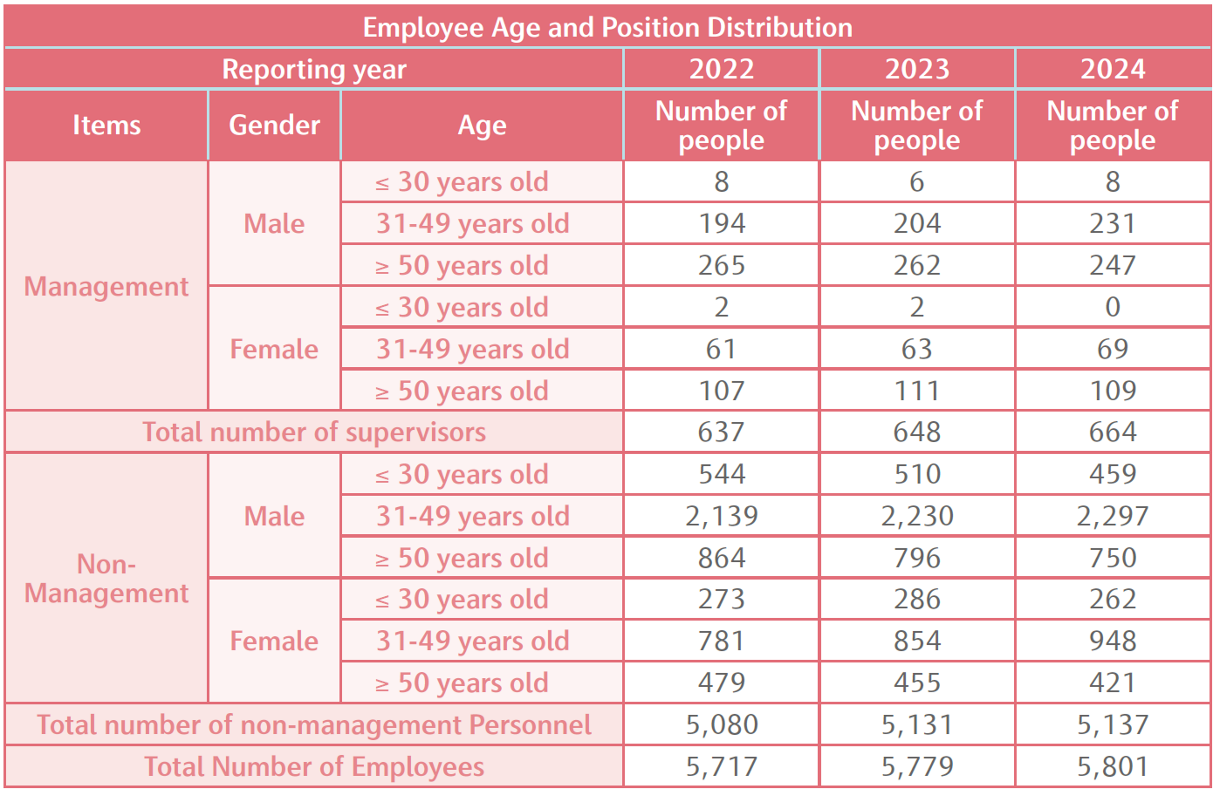 Employee Age and Position Distribution.png
Employee Age and Position Distribution.png
 Statistics of Minority and Vulnerable Groups Employees.png
Statistics of Minority and Vulnerable Groups Employees.png
Childcare Leave System
Employees who have worked for at least six months are eligible for a childcare leave system that exceeds statutory standards:
• Employees may apply for a one-hour daily reduction in working hours with full pay to care for children under the age of three—an enhanced benefit exceeding the statutory provision, which does not mandate paid leave.
• Employees may apply for unpaid parental leave for up to three years to care for children under the age of three, surpassing the statutory maximum of two years.
Employees who have worked for at least six months are eligible for a childcare leave system that exceeds statutory standards:
• Employees may apply for a one-hour daily reduction in working hours with full pay to care for children under the age of three—an enhanced benefit exceeding the statutory provision, which does not mandate paid leave.
• Employees may apply for unpaid parental leave for up to three years to care for children under the age of three, surpassing the statutory maximum of two years.
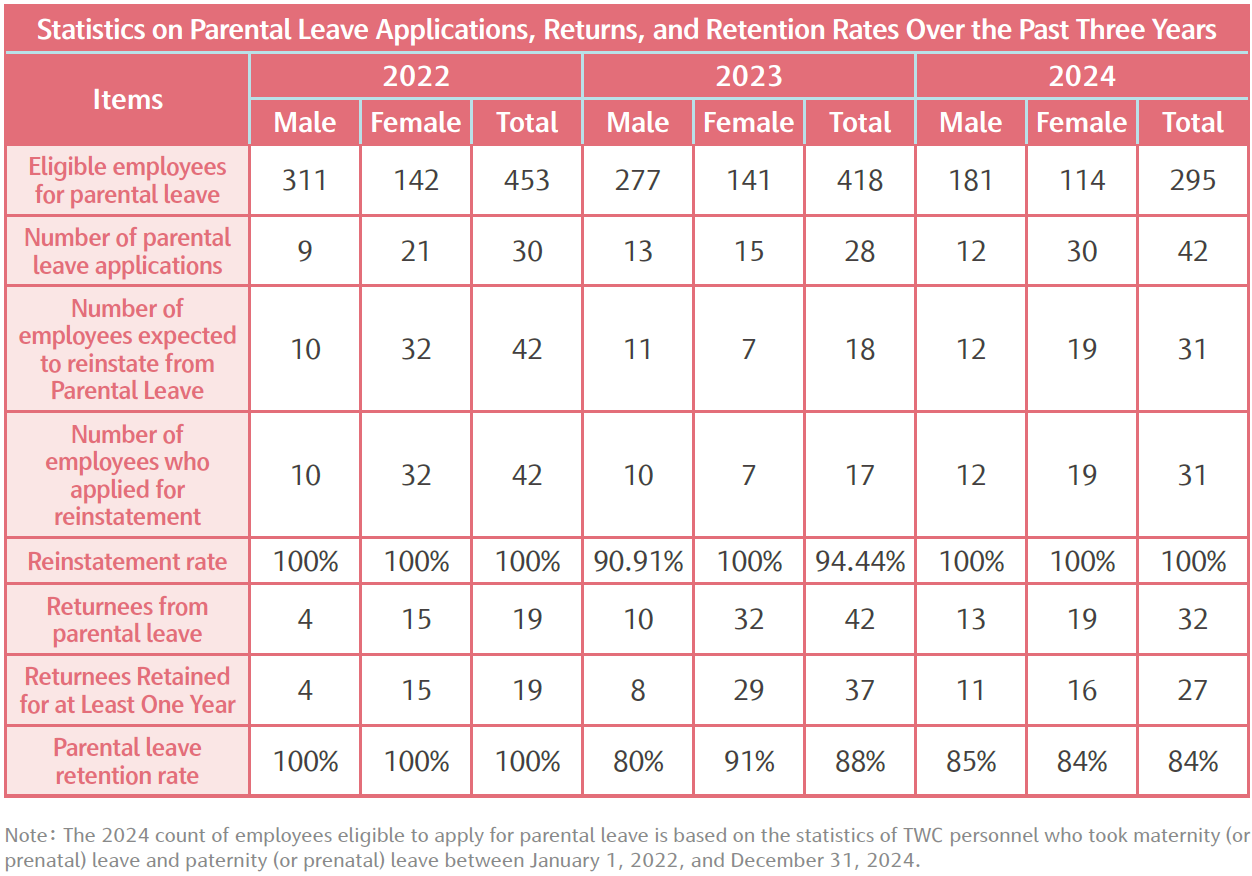 Statistics on Parental Leave Applications, Returns, and Retention Rates Over the Past Three Years.png
Statistics on Parental Leave Applications, Returns, and Retention Rates Over the Past Three Years.png
Labor Relations and Communication Mechanism
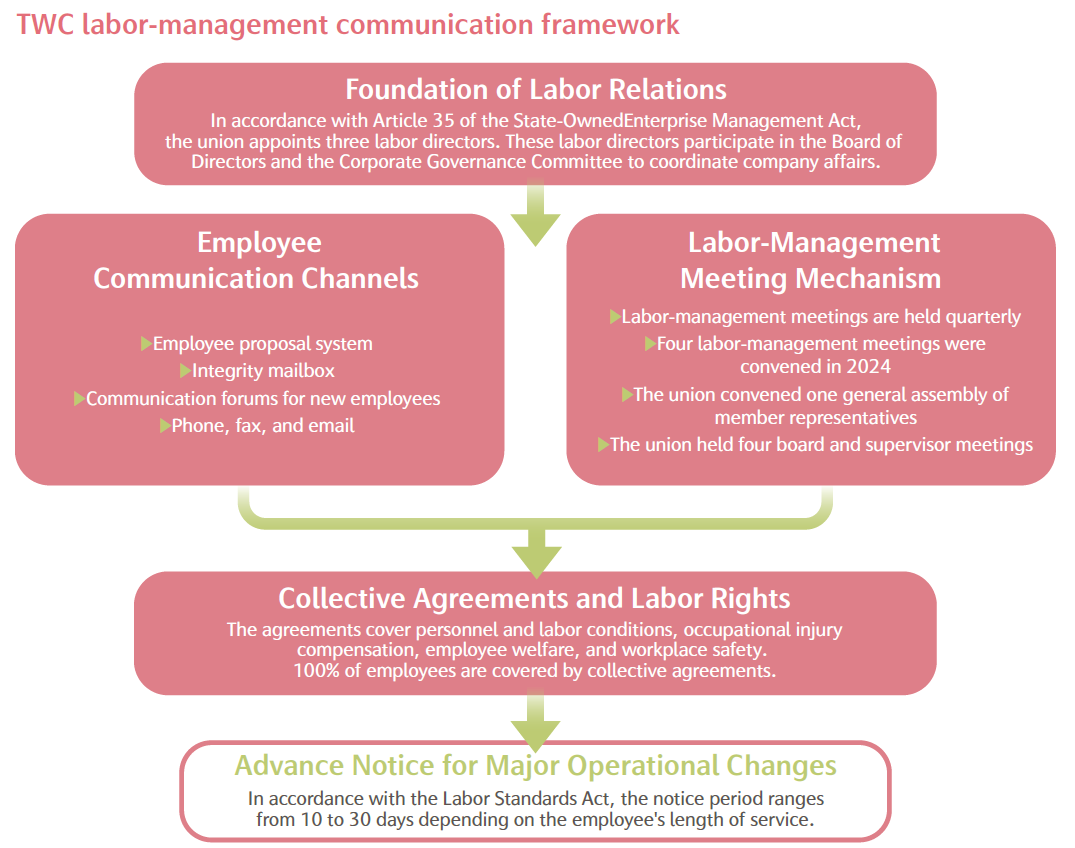 TWC labor-management communication framework.png
TWC labor-management communication framework.png
Occupational Safety and Health
Occupational Safety and Health Training
TWC has established a comprehensive occupational safety and health training system to ensure that both employees and non-employee workers possess the necessary safety knowledge and skills. The training covers general safety topics as well as targeted instruction addressing specific occupational hazards and dangerous situations.
For special occupational hazards, the company provides specialized safety training, including operation of high-pressure gas equipment, forklift operation, safety and health education for personnel handling or using hazardous chemicals, and supervisory training for high-risk operations involving harmful substances (such as organic compounds, special chemicals, lead, and tetraethyl lead). Additionally, TWC conducts mental healthrelated courses, such as “Workplace Bullying Prevention and Management,” taught by professional legal experts, to strengthen the protection of employees’ physical and mental well-being.
TWC has established a comprehensive occupational safety and health training system to ensure that both employees and non-employee workers possess the necessary safety knowledge and skills. The training covers general safety topics as well as targeted instruction addressing specific occupational hazards and dangerous situations.
For special occupational hazards, the company provides specialized safety training, including operation of high-pressure gas equipment, forklift operation, safety and health education for personnel handling or using hazardous chemicals, and supervisory training for high-risk operations involving harmful substances (such as organic compounds, special chemicals, lead, and tetraethyl lead). Additionally, TWC conducts mental healthrelated courses, such as “Workplace Bullying Prevention and Management,” taught by professional legal experts, to strengthen the protection of employees’ physical and mental well-being.
 2024 Occupational Safety and Health Training Hours.png
2024 Occupational Safety and Health Training Hours.png
Health Services and Promotion
TWC implements a comprehensive annual health examination system to regularly monitor employees’ health status. General health examinations are conducted in accordance with Schedule 9 of the Labor Health Protection Regulations, covering comprehensive assessments of various body systems, chest X-rays, and blood biochemical tests to ensure basic health monitoring for employees. Special health examinations follow Schedule 10 of the same regulations and are targeted at employees working in environments with specific health hazards, including noise, dust, lead exposure, and other chemical substances, to assess the health impacts of these potential risks.
TWC implements a comprehensive annual health examination system to regularly monitor employees’ health status. General health examinations are conducted in accordance with Schedule 9 of the Labor Health Protection Regulations, covering comprehensive assessments of various body systems, chest X-rays, and blood biochemical tests to ensure basic health monitoring for employees. Special health examinations follow Schedule 10 of the same regulations and are targeted at employees working in environments with specific health hazards, including noise, dust, lead exposure, and other chemical substances, to assess the health impacts of these potential risks.
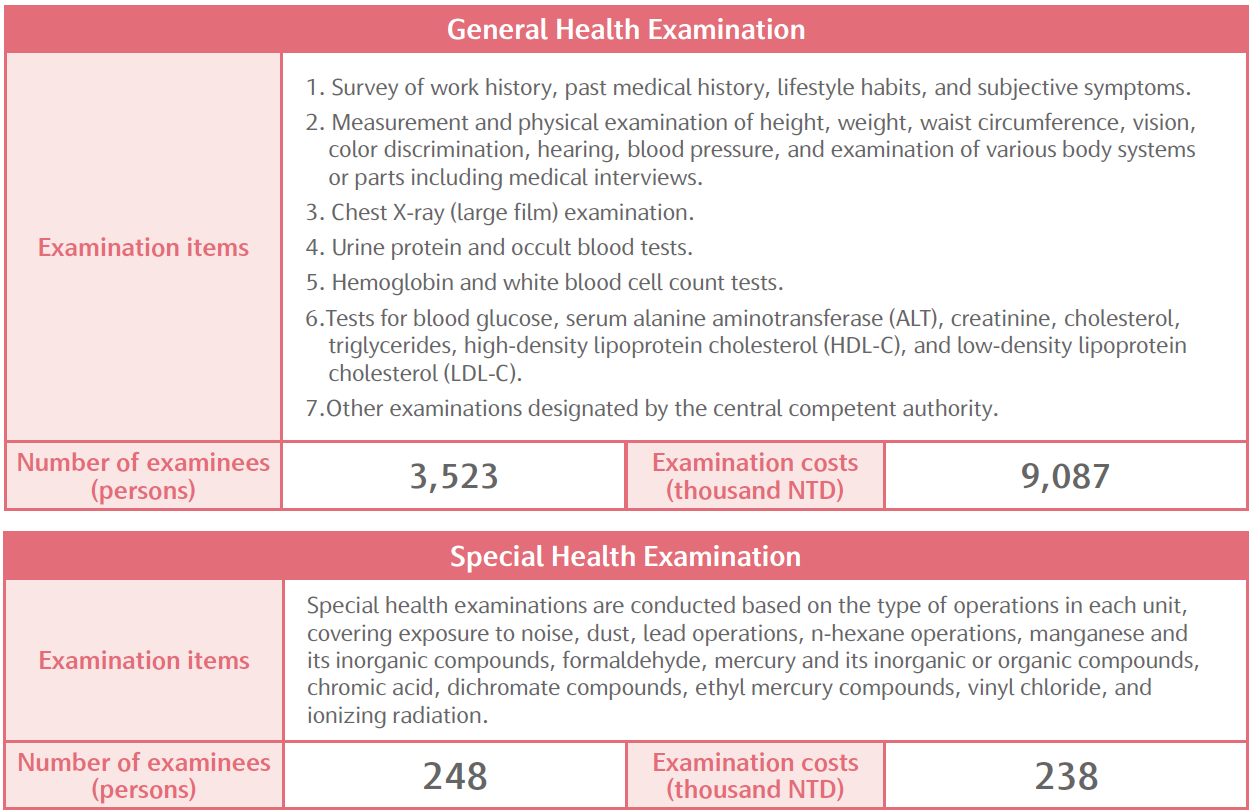 Health Examination Statistics for 2024.png
Health Examination Statistics for 2024.png
Social Collaboration
Environmental Education Promotion and Achievements
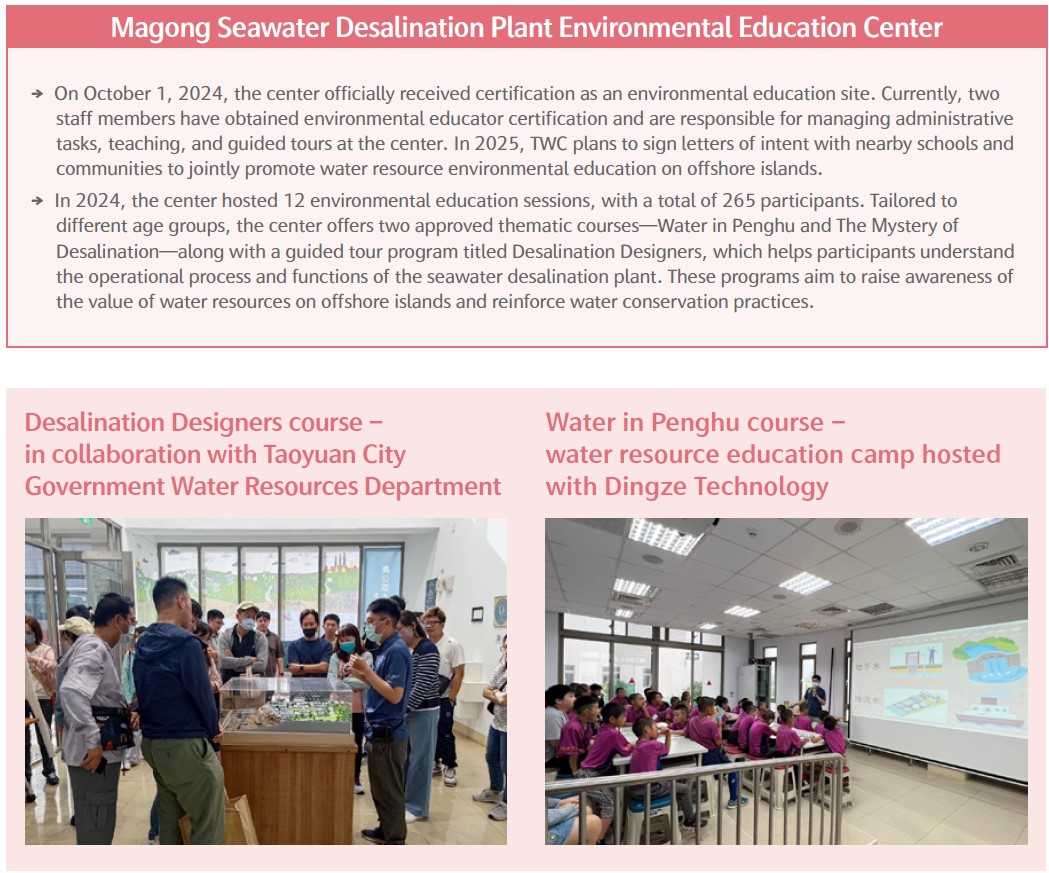 Magong Seawater Desalination Plant Environmental Education Center.jpg
Magong Seawater Desalination Plant Environmental Education Center.jpg
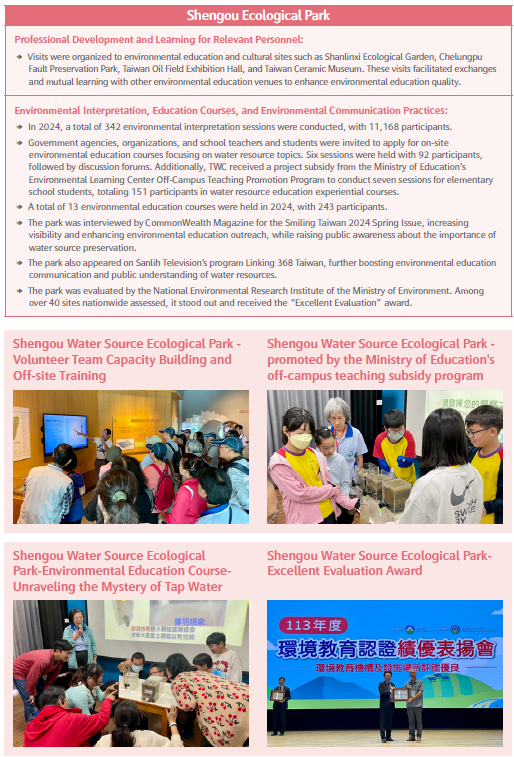 Shengou Ecological Park.png
Shengou Ecological Park.png
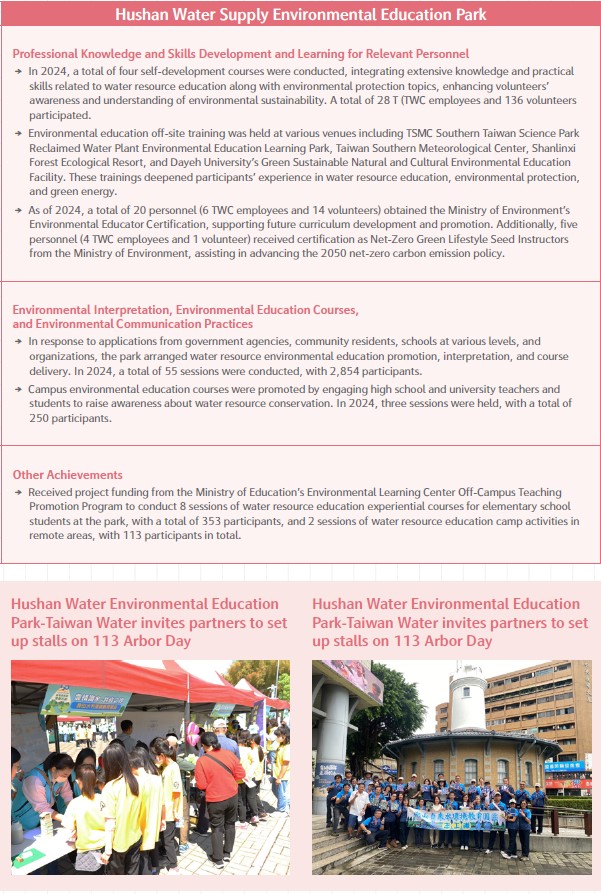 Hushan Water Supply Environmental Education Park.jpg
Hushan Water Supply Environmental Education Park.jpg
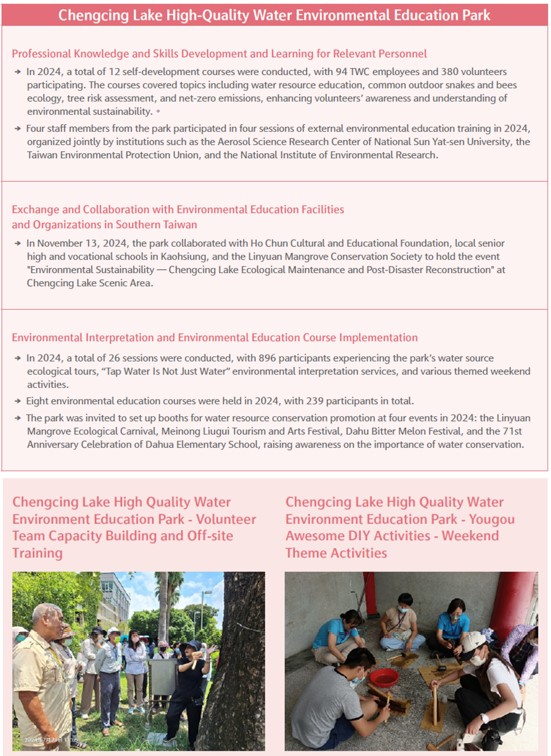 Chengcing Lake High-Quality Water Environmental Education Park.jpg
Chengcing Lake High-Quality Water Environmental Education Park.jpg
Special Feature on Social Collaboration and Contribution
Faced with long-standing water leakage issues in aging highland communities, Taiwan Water Corporation empathized with residents and proactively took responsibility for resolving problems that were originally the users' own to address. Upholding the service philosophy of "people-centered care," the First Management District Office actively promoted public-private partnerships, working closely with government agencies and elected representatives to engage directly with communities and listen to local needs.
From a practical standpoint, based on the cases of Xingfu Huacheng Community in Keelung City and Zhuanguan Taipei Community, the estimated internal return on investment (ROI) for Taiwan Water’s upgrades to pressurized water supply facilities was -66.28, indicating that the project would not be financially beneficial from a business perspective. However, in terms of social impact, the company adopted the SROI methodology to assess how the aging highland community improvement project influenced residents' well-being.
As a measurement tool for “policy happiness,” the evaluation yielded an SROI of 5.79, meaning that every one dollar invested brings a return of 5.79 dollars in value to Taiwanese society. This demonstrates that the aging highland community improvement project generates positive social benefits and continually reminds us of Taiwan Water Corporation’s significant responsibility and sustainable value to Taiwanese society.
Through a comprehensive assessment, we identified that improving the aging water supply system not only ensures stable water access for residents but also reduces leakage, lowers maintenance frequency, and minimizes road excavation that disrupts traffic, thus delivering multifaceted value.
By leveraging a diverse collaboration mechanism—from policy advocacy and technical support to cost-sharing adjustments—Taiwan Water not only provides professional maintenance and replacement services but also employs innovative approaches such as smart management systems and environmental education to strengthen partnerships with communities. When residents of Xingfu Huacheng happily share, “After Taiwan Water’s improvements, our water bills dropped significantly, and water supply has become more stable,” this genuine feedback fuels Taiwan Water’s ongoing commitment to sustainable water supply for Taiwanese society.
Faced with long-standing water leakage issues in aging highland communities, Taiwan Water Corporation empathized with residents and proactively took responsibility for resolving problems that were originally the users' own to address. Upholding the service philosophy of "people-centered care," the First Management District Office actively promoted public-private partnerships, working closely with government agencies and elected representatives to engage directly with communities and listen to local needs.
From a practical standpoint, based on the cases of Xingfu Huacheng Community in Keelung City and Zhuanguan Taipei Community, the estimated internal return on investment (ROI) for Taiwan Water’s upgrades to pressurized water supply facilities was -66.28, indicating that the project would not be financially beneficial from a business perspective. However, in terms of social impact, the company adopted the SROI methodology to assess how the aging highland community improvement project influenced residents' well-being.
As a measurement tool for “policy happiness,” the evaluation yielded an SROI of 5.79, meaning that every one dollar invested brings a return of 5.79 dollars in value to Taiwanese society. This demonstrates that the aging highland community improvement project generates positive social benefits and continually reminds us of Taiwan Water Corporation’s significant responsibility and sustainable value to Taiwanese society.
Through a comprehensive assessment, we identified that improving the aging water supply system not only ensures stable water access for residents but also reduces leakage, lowers maintenance frequency, and minimizes road excavation that disrupts traffic, thus delivering multifaceted value.
By leveraging a diverse collaboration mechanism—from policy advocacy and technical support to cost-sharing adjustments—Taiwan Water not only provides professional maintenance and replacement services but also employs innovative approaches such as smart management systems and environmental education to strengthen partnerships with communities. When residents of Xingfu Huacheng happily share, “After Taiwan Water’s improvements, our water bills dropped significantly, and water supply has become more stable,” this genuine feedback fuels Taiwan Water’s ongoing commitment to sustainable water supply for Taiwanese society.
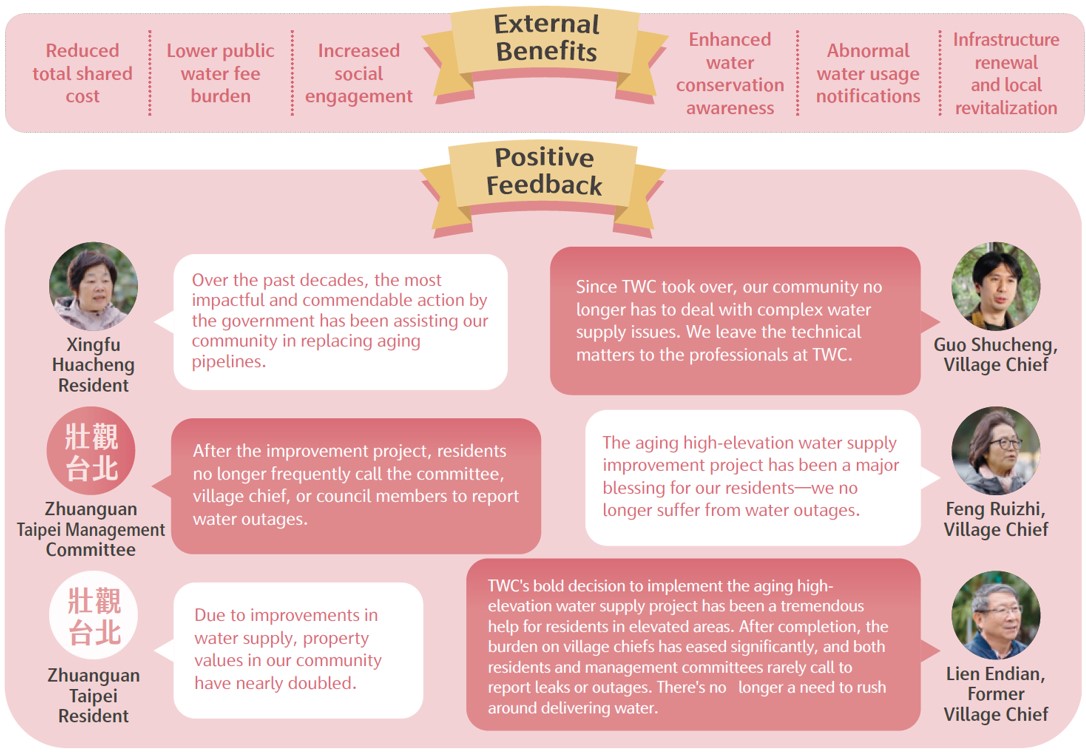 Benefits of Water Supply Improvements in Aging Highland Communities.jpg
Benefits of Water Supply Improvements in Aging Highland Communities.jpg


